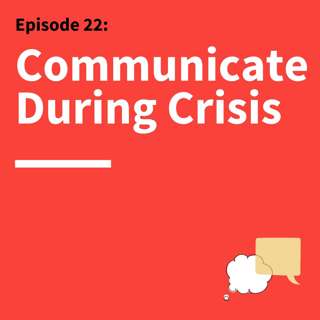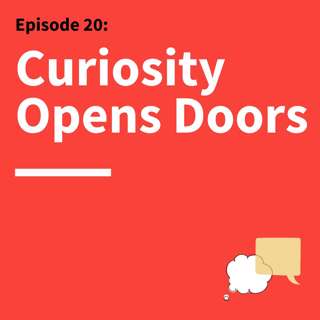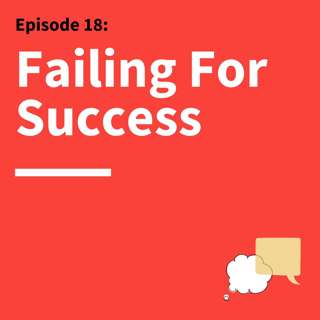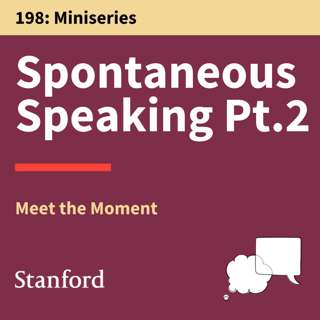
25. Quick Thinks: All Effective Communication Must Start With This
As we look back on more than 20 interviews with Think Fast, Talk Smart guests, we’ve heard one piece of advice over and again: Know Your Audience. This wisdom echoes what research clearly shows: Content that is relevant and meaningful to an audience is more likely to be heard, retained and acted upon. The word communication comes from the Latin for to “make common,” yet many of us start our message from the wrong place. As lecturer and podcast host Matt Abrahams shares in this Quick Thinks episode, by taking the time to learn about our audience and their needs, we can better craft our messages for them and be more useful, engaging and successful.Connect:Premium Signup >>>> Think Fast Talk Smart PremiumEmail Questions & Feedback >>> hello@fastersmarter.ioEpisode Transcripts >>> Think Fast Talk Smart WebsiteNewsletter Signup + English Language Learning >>> FasterSmarter.ioThink Fast Talk Smart >>> LinkedIn, Instagram, YouTubeMatt Abrahams >>> LinkedIn
4 Dec 20207min

24. Feelings First: How Emotion Shapes Our Communication, Decisions, and Experiences
“Something like 90 to 95% of our decisions and behaviors are constantly being shaped the non-consciously by emotional brain system.” In this episode of Think Fast, Talk Smart, Professor of Marketing Baba Shiv sits down with lecturer and host Matt Abrahams to share his research on how emotions affect our, and our audience’s, decision making. “You’ve got to pay careful attention to the audience that you’re talking to and allow the person to talk,” Shiv says. “Allow the person to talk because then, the person has ownership of the idea.” Connect:Premium Signup >>>> Think Fast Talk Smart PremiumEmail Questions & Feedback >>> hello@fastersmarter.ioEpisode Transcripts >>> Think Fast Talk Smart WebsiteNewsletter Signup + English Language Learning >>> FasterSmarter.ioThink Fast Talk Smart >>> LinkedIn, Instagram, YouTubeMatt Abrahams >>> LinkedIn
20 Nov 202026min

23. Look Within: How to Lead with Self Awareness and Vulnerability
“Effective is being able to achieve your goals, which is important, but there are plenty of people who achieve their goals that most of us would find unworthy. So the question what does it take to be a good leader requires you to reflect on the values that you hold dear.”In this episode of Think Fast, Talk Smart, Senior Associate Dean and Professor of Organizational Behavior Brian Lowery sits down with lecturer and host Matt Abrahams to discuss the importance of self inquiry and an examination of one's own values in order to be effectively communicate and lead. “Society is not designed, really, to evoke deep thought about the fault lines in the broader community," Lowery says. "That’s not something that is going to be presented to you. It’s something that you have to look for and pay attention to.”Connect:Premium Signup >>>> Think Fast Talk Smart PremiumEmail Questions & Feedback >>> hello@fastersmarter.ioEpisode Transcripts >>> Think Fast Talk Smart WebsiteNewsletter Signup + English Language Learning >>> FasterSmarter.ioThink Fast Talk Smart >>> LinkedIn, Instagram, YouTubeMatt Abrahams >>> LinkedIn
6 Nov 202034min

22. Under Pressure: How to Communicate Clearly and Timely During a Crisis
“Knowing your values gives you a beacon, or a lamppost, that can inform how you’re going to prioritize your actions.” In this episode of Think Fast, Talk Smart, Stanford Graduate School of Business lecturer and Stanford University’s former Vice President of Public Affairs David Demarest speaks with host and lecturer Matt Abrahams on why knowing your values and the concerns of your stakeholders lays the foundation for any communication during a time of crisis.Connect:Premium Signup >>>> Think Fast Talk Smart PremiumEmail Questions & Feedback >>> hello@fastersmarter.ioEpisode Transcripts >>> Think Fast Talk Smart WebsiteNewsletter Signup + English Language Learning >>> FasterSmarter.ioThink Fast Talk Smart >>> LinkedIn, Instagram, YouTubeMatt Abrahams >>> LinkedIn
22 Okt 202029min

21. Words Matter: How to Make Your Communication Inclusive
What way can the language we use reinforce existing stereotypes and biases? In this episode of Think Fast, Talk Smart, Sarah Soule, Senior Associate Dean and Professor of Organizational Behavior sits down with lecturer and host Matt Abrahams to discuss how even the details of our word choice can shape culture, for better or worse. Connect:Premium Signup >>>> Think Fast Talk Smart PremiumEmail Questions & Feedback >>> hello@fastersmarter.ioEpisode Transcripts >>> Think Fast Talk Smart WebsiteNewsletter Signup + English Language Learning >>> FasterSmarter.ioThink Fast Talk Smart >>> LinkedIn, Instagram, YouTubeMatt Abrahams >>> LinkedIn
9 Okt 202024min

20. Question Your Questions: How to Spark Creativity in Your Communication
“Sparking communication starts with asking why or what or how.” On this episode of Think Fast, Talk Smart, Tina Seelig, the Professor of the Practice in Stanford’s department of Management Science and Engineering, sits down with podcast host and lecturer Matt Abrahams to talk about the structures of storytelling that will help become more creative communicators and the importance of asking questions about everything we do. “Having a mindset of curiosity opens the door to great communication,” Seelig says. “The more questions you ask, the more you learn, the more engaged you will be with others.”Connect:Premium Signup >>>> Think Fast Talk Smart PremiumEmail Questions & Feedback >>> hello@fastersmarter.ioEpisode Transcripts >>> Think Fast Talk Smart WebsiteNewsletter Signup + English Language Learning >>> FasterSmarter.ioThink Fast Talk Smart >>> LinkedIn, Instagram, YouTubeMatt Abrahams >>> LinkedInShow notes:Creativity Rules: Get Ideas Out of Your Head and Into the World inGenius: A Crash Course on CreativityStanford Technology Ventures Program Knight Hennessy Scholars program
25 Sep 202027min

19. Showing Your Smile From Behind a Mask: How Culture and Emotion Impact Communication
“In companies, you’re interacting with other people who come from different cultural contexts, and in order to be effective, you have to understand how much of your own communication and other people’s communication is shaped by their cultural ideas and their cultural values.” On this episode of Think Fast, Talk Smart, host Matt Abrahams sits down with Jeanne Tsai, an associate professor of Psychology at Stanford and director of the Culture and Emotion Lab. Jeanne’s research focuses on cultural influences on psychological and social processes related to emotion. Jeanne discusses why wearing a mask is more accepted for some cultures, and seen as prohibiting communication in others. “Communication is just one of the places where you really can see culture at work,” she says. “In cultural contexts that promote these more independent views of the self, the core goal of communication is to express yourself, to express those beliefs, preferences and desires that define who you are.” Connect:Premium Signup >>>> Think Fast Talk Smart PremiumEmail Questions & Feedback >>> hello@fastersmarter.ioEpisode Transcripts >>> Think Fast Talk Smart WebsiteNewsletter Signup + English Language Learning >>> FasterSmarter.ioThink Fast Talk Smart >>> LinkedIn, Instagram, YouTubeMatt Abrahams >>> LinkedIn
11 Sep 202027min

18. Managing in the Moment: How to Get Comfortable with Being Uncomfortable
“The less time you can spend dwelling on your mistakes, the more mental energy you can devote to doing what you need to do in that moment.” On this episode of Think Fast, Talk Smart, Christian Wheeler, the StrataComm Professor of Management and Professor of Marketing at Stanford Graduate School Business, sits down with podcast host and lecturer Matt Abrahams to talk about embracing failure and managing your team in-the-moment. “When we’re confronted with personal failure, it feels bad to us. And we work hard to try to avoid that failure, and that can often be counterproductive,” Wheeler says. “But failing is something that’s on the pathway to success.”Connect:Premium Signup >>>> Think Fast Talk Smart PremiumEmail Questions & Feedback >>> hello@fastersmarter.ioEpisode Transcripts >>> Think Fast Talk Smart WebsiteNewsletter Signup + English Language Learning >>> FasterSmarter.ioThink Fast Talk Smart >>> LinkedIn, Instagram, YouTubeMatt Abrahams >>> LinkedIn
28 Aug 202034min






















